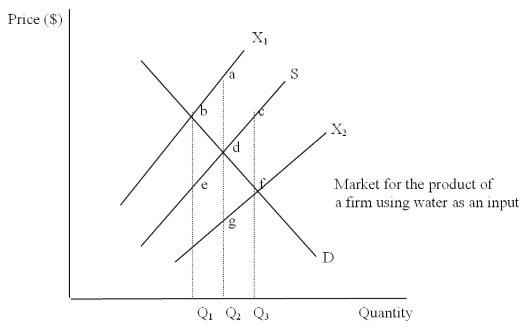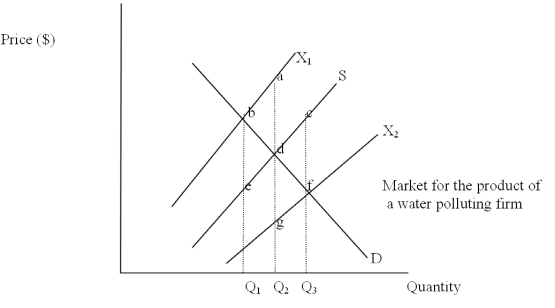Exam 4: Pollution Problems: Must We Foul Our Own Nests
Exam 1: Alleviating Human Misery: The Role of Economic Reasoning124 Questions
Exam 2: Economic Systems, Resource Allocation, and Social Well-Being: Lessons From Chinas Transition122 Questions
Exam 3: Government Control of Prices in Mixed Systems: Who Are the Winners and Losers123 Questions
Exam 4: Pollution Problems: Must We Foul Our Own Nests128 Questions
Exam 5: Economics of Crime and Its Prevention: How Much Is Too Much126 Questions
Exam 6: The Economics of Education: Crisis and Reform122 Questions
Exam 7: Poverty Problems and Discrimination: Why Are so Many Still so Poor121 Questions
Exam 8: The Economics of Monopoly Power: Can Markets Be Controlled129 Questions
Exam 9: The Economics of Professional Sports: What Is the Real Score120 Questions
Exam 10: Competition in the Global Market-Place: Should We Protect Ourselves From International Trade131 Questions
Exam 11: Economic Growth: Why Is the Economic Road so Bumpy138 Questions
Exam 12: Money,Banking and the Financial System: Old Problems With New Twists130 Questions
Exam 13: Unemployment and Inflation: Can We Find a Balance119 Questions
Exam 14: Government Spending,Taxation,and the National Debt: Who Wins and Who Loses125 Questions
Exam 15: Social Security and Medicare: How Secure Is Our Safety Net for the Elderly124 Questions
Select questions type
Costs incurred by the producer for the use of self-owned resources are called
Free
(Multiple Choice)
4.8/5  (35)
(35)
Correct Answer:
A
When the marginal private benefit of an activity does not equal the marginal social benefit,which of the following exists?
Free
(Multiple Choice)
4.9/5  (42)
(42)
Correct Answer:
C
An advantage of direct regulation as a method of controlling pollution is that
Free
(Multiple Choice)
4.8/5  (33)
(33)
Correct Answer:
E
When pollution rights markets are created,those firms who can reduce pollution most cheaply will do so.
(True/False)
4.8/5  (24)
(24)
Water pollution is measured in terms of the amount of toxins in the water.
(True/False)
4.8/5  (33)
(33)
Federal grants made to state and local governments for the construction of sewage treatment facilities encourage private industries to develop low pollution methods of production.
(True/False)
4.9/5  (35)
(35)
Direct prohibition of pollution has the disadvantage of providing economic incentives for polluters not to pollutE.
(True/False)
4.8/5  (46)
(46)
An upstream paper mill pollutes water used by a downstream water bottling plant,forcing the latter to clean the water it uses.Which of the following is true?
(Multiple Choice)
4.8/5  (39)
(39)
The most efficient way to control pollution is direct prohibition of polluting activities by the government.
(True/False)
4.9/5  (42)
(42)
Net social benefits will always be increased by increasing pollution control if the marginal social benefit of the increase in pollution control is greater than the marginal social cost of additional control efforts.
(True/False)
4.9/5  (39)
(39)
The Following Questions Refer to the graph below.  -Social well-being would be enhanced if output of the water-using firm were to
-Social well-being would be enhanced if output of the water-using firm were to
(Multiple Choice)
4.9/5  (44)
(44)
If Jim starts a landscape business and uses a truck and a tractor that he owns to perform landscaping projects,we can conclude that
(Multiple Choice)
4.8/5  (35)
(35)
If polluters were forced to pay the full cost of their activities,the price of goods produced by polluting firms would risE.
(True/False)
4.8/5  (32)
(32)
Pollution did not exist in any appreciable amounts prior to the Industrial Revolution.
(True/False)
5.0/5  (42)
(42)
Which of the following creates a positive externality in consumption?
(Multiple Choice)
4.7/5  (29)
(29)
Direct or mandatory control imposed by government on polluters presupposes that the regulatory body can
(Multiple Choice)
4.7/5  (33)
(33)
The Following Questions Refer to the graph below.  -The value of well-being lost due to over-production of the polluting firm's product is equal to area
-The value of well-being lost due to over-production of the polluting firm's product is equal to area
(Multiple Choice)
4.7/5  (40)
(40)
A market for pollution rights is an efficient approach to pollution control because
(Multiple Choice)
4.9/5  (48)
(48)
Showing 1 - 20 of 128
Filters
- Essay(0)
- Multiple Choice(0)
- Short Answer(0)
- True False(0)
- Matching(0)